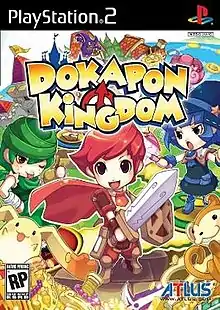Dokapon Kingdom
Dokapon Kingdom[lower-alpha 1] is a role-playing video game developed by Sting and published by Examu in Japan for PlayStation 2 on November 22, 2007. It was published by Atlus in North America on October 14, 2008. It is a remake of the 1994 Super Famicom title, Dokapon 3・2・1 – Arashi o Yobu Yuujou. The PlayStation 2 version was later re-released in Japan on November 20, 2008. It was ported to the Wii by Sting Entertainment on July 31, 2008, as Dokapon Kingdom for Wii. The Wii version was published in North America by Atlus on October 14, 2008, and in Europe by BigBen Interactive on March 26, 2010.[1][2]
| Dokapon Kingdom | |
|---|---|
 | |
| Developer(s) | Sting |
| Publisher(s) | Examu Atlus BigBen Interactive |
| Series | Dokapon |
| Platform(s) | PlayStation 2, Wii |
| Release | PlayStation 2 Wii |
| Genre(s) | Role-playing |
Gameplay
The game is a hybrid board game and role-playing video game with modes varying from story mode to battle royale in which four players are assigned a mission. Players spin a spinner and then move to any spot on the board that is reachable by moving that number of spaces. Players will have the freedom to choose the direction they want to go. Landing on an "empty" yellow space or another player will typically cause a battle, but sometimes the player will encounter a strange traveler that may allow them to play them at a minigame, or hire their services to steal or harm the other players. The battle system plays out in roshambo style, with the attack option beating counter, the counter option beating strike, and the defend option resisting the attack option. Multiple magics and stat changes play out both in battle and on the game board, while class-specific skills increase with player's job level.
Three starting jobs are available to the new adventurer (warrior, thief, and magician), and following a pattern of leveling, eleven character jobs and darkling (if someone hears the whisper of the dark revenge, usually the current last place player) are possible. The game is won by the player with the most money at the end. The winner gets to marry the king's daughter if the player is male; the king makes an offer himself if the player is female, but will be rejected. However, regardless of gender, the winner takes the control of the kingdom.
Plot
The game takes place in a fictional land called "Dokapon Kingdom" which is being attacked by an army of monsters. Seeing this, the king offers Penny, his daughter, to be married to the player who finishes the game with the most money. 2–4 adventurers hear this, and attempt to save the kingdom. The game ends when each of the main bosses are defeated, although the player can select other game options to make the game end faster.
Reception
| Aggregator | Score | |
|---|---|---|
| PS2 | Wii | |
| Metacritic | 61/100[3] | 73/100[4] |
| Publication | Score | |
|---|---|---|
| PS2 | Wii | |
| 1Up.com | N/A | C[5] |
| Destructoid | N/A | 8/10[6] |
| Famitsu | 26/40[7] | N/A |
| GamesRadar+ | ||
| GameZone | 6/10[9] | 8.4/10[10] |
| IGN | 8/10[11] | 8/10[12] |
| Nintendo Life | N/A | 8/10[13] |
| Nintendo Power | N/A | 8.5/10[14] |
| Nintendo World Report | N/A | 8/10[15] |
| PSM | N/A | |
| Wired | N/A | 9/10[17] |
The game received "mixed or average reviews" on both platforms according to the review aggregation website Metacritic.[3][4] In Japan, Famitsu gave the PlayStation 2 version a score of three sevens and one five for a total of 26 out of 40.[7]
The Wii version was nominated for Best RPG by IGN in its 2008 video game awards.[18]
References
- "Bigben Interactive: annonce l'arrivée de Dokapon Kingdom". Actufinance (Press release) (in French). Boursier. 8 March 2010. Retrieved 17 January 2020.
- Leuenberg, Christian (13 December 2010). "Testbericht: Dokapon Kingdom". Wii Insider (in German). Retrieved 17 January 2020.
- "Dokapon Kingdom for PlayStation 2 Reviews". Metacritic. CBS Interactive. Retrieved January 21, 2019.
- "Dokapon Kingdom for Wii Reviews". Metacritic. CBS Interactive. Retrieved January 13, 2014.
- Fitch, Andrew (October 24, 2008). "Dokapon Kingdom Review (Wii)". 1UP.com. Ziff Davis. Archived from the original on March 9, 2016. Retrieved January 21, 2019.
- North, Dale (October 24, 2008). "Destructoid review: Dokapon Kingdom (Wii)". Destructoid. Enthusiast Gaming. Retrieved January 21, 2019.
- "Famitsu #989, reviews and utter lack of worthwhile news". NeoGAF. NeoGaf LLC. November 14, 2007. Retrieved January 21, 2019.
- Gudmundson, Carolyn (October 21, 2008). "Dokapon Kingdom review". GamesRadar+. Future plc. Retrieved January 21, 2019.
- Bedigian, Louis (October 14, 2008). "Dokapon Kingdom – PS2 – Review". GameZone. Archived from the original on December 30, 2008. Retrieved January 21, 2019.
- Platt, Dylan (October 29, 2008). "Dokapon Kingdom – WII – Review". GameZone. Archived from the original on December 18, 2008. Retrieved January 21, 2019.
- Bozon, Mark (October 17, 2008). "Dokapon Kingdom Review (PS2)". IGN. Ziff Davis.
- Bozon, Mark (October 15, 2008). "Dokapon Kingdom Review (Wii)". IGN. Ziff Davis. Retrieved January 21, 2019.
- Reddick, Stuart (April 1, 2009). "Dokapon Kingdom Review". Nintendo Life. Gamer Network. Retrieved January 21, 2019.
- "Dokapon Kingdom". Nintendo Power. Vol. 235. Future US. December 2008. p. 100.
- Rosenberg, Jared (December 2, 2008). "Dokapon Kingdom". Nintendo World Report. NINWR, LLC. Retrieved January 21, 2019.
- "Review: Dokapon Kingdom". PlayStation: The Official Magazine. No. 13. Future plc. December 2008. p. 82.
- Cavalli, Earnest (October 15, 2008). "Review: Quirky Fun Makes Dokapon Kingdom the Perfect Wii Party Game". Wired. Condé Nast. Retrieved January 21, 2019.
- "Best of 2008 (Best RPG)". IGN. IGN Entertainment. December 18, 2008. Archived from the original on December 22, 2008. Retrieved December 19, 2008.